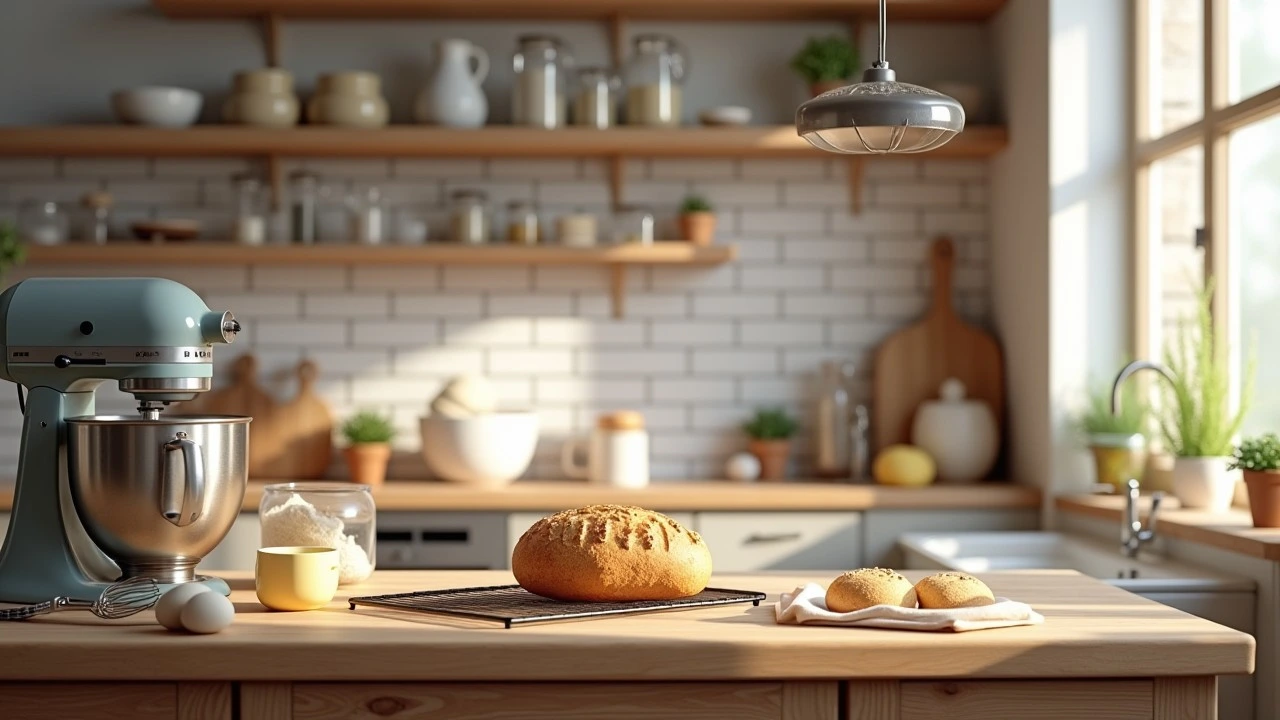When it comes to baking essentials, having the right tools and ingredients is key to success. The world of baking can feel overwhelming, but once you gather your baking essentials, you’ll wonder how you ever managed without them. Whether it’s a trusty whisk, a set of measuring cups, or the perfect non-stick bakeware, these baking essentials make all the difference.
If you’re a beginner, don’t stress about having every item right away. Start small and add to your collection over time. As long as you stick to the baking essentials mentioned in this guide, you’ll set yourself up for consistent, delicious results every time you step into the kitchen.
Why Baking Essentials Matter (And Why Your Grandma Was Right)
First things first—baking isn’t like cooking where you can just wing it. It’s more like science class with a side of sweet rewards. The tools you use and the ingredients you grab can make or break your recipe. Trust me, I’ve tried eyeballing flour and ended up with cookies that could double as hockey pucks. The good news? Once you’ve got the basics down, you’re golden.
Essential Baking Equipment for Perfect Results
Measuring Cups and Spoons
Listen, if you’re using your coffee mug to measure flour, we need to talk. Proper measuring tools are a non-negotiable in baking. Dry ingredients go in flat-bottomed cups, while liquids need those clear glass ones with spouts. Pro tip: A digital scale takes things to a whole new level of accuracy (and makes you feel like a total pro).
Mixing Bowls and Whisks
You can’t mix cookie dough in a salad bowl. Well, you could, but let’s not. A good set of mixing bowls—preferably in different sizes—is a game-changer. Pair that with a sturdy whisk, and you’re ready to handle everything from pancake batter to whipped cream.
Reliable bakeware for consistent baking
Non-stick baking sheets, muffin tins, and cake pans are where the magic happens. If you’re serious about cookies not sticking (and saving yourself from scrubbing disasters), line your pans with parchment paper. It’s a lifesaver. Oh, and get yourself a cooling rack—it’s worth every penny.
Key Baking Ingredients You Should Always Have
Flour Power
All-purpose flour is your best friend, but don’t sleep on specialty flours like bread or cake flour. They each bring a little something extra to the party. If you’re going gluten-free, almond or coconut flour is a solid option—just remember, they don’t behave exactly like regular flour.
The Sweet Stuff
Sugar isn’t just sugar, folks. Granulated sugar, brown sugar, and powdered sugar all do different jobs. Brown sugar adds moisture and a caramel-y vibe, while powdered sugar gives frostings that dreamy, melt-in-your-mouth texture.
Fats and Oils
Butter is king. Period. But don’t forget about oils like vegetable or coconut oil for cakes that need a little extra moisture. Oh, and if you’re feeling fancy, try ghee—it adds a rich, nutty flavor that’s unreal.
Leavening Agents
This is the science-y part. Baking soda and baking powder help your goodies rise, while yeast is the MVP for breads and doughs. Just make sure these are fresh—expired leaveners are like bad Wi-Fi: they just don’t work.
How to Set Up Your Baking Station (And Look Like You Know What You’re Doing)
Keep your workspace clean and organized, so you’re not running around looking for a missing whisk mid-recipe. I like to keep my measuring cups and spoons in a drawer right next to my mixing bowls—it’s the little things that make a big difference. And if your kitchen’s tiny (like mine), invest in stackable storage containers for your flours and sugars. It’s a game-changer.
Common Baking Goofs (And How to Fix Them)
Overmixing the Batter
This one’s easy to do. Too much mixing can make your cakes dense and chewy (and not in a good way). Stop mixing as soon as the ingredients come together—no need to keep going.
Oven Temperature Drama
Let’s be real: ovens have trust issues. Always preheat, and if you’re unsure about the temp, get an oven thermometer. It’s not just for perfectionists; it’s for anyone who’s ever baked cookies that came out raw in the middle.
Skipping the Cooling Step
I get it—you want that warm brownie now. But letting your baked goods cool is key to their texture and flavor. So, step away from the pan for a few minutes. You’ve got this.
Quick Tips for Baking Like a Boss
- Room Temperature Ingredients: Butter and eggs mix better when they’re not straight from the fridge. Let them sit out for about 30 minutes.
- Double Check Expiration Dates: Old baking powder or stale flour can ruin the best recipes.
- Don’t Peek in the Oven: Opening the door too soon can cause your cake to sink. Patience, my friend.
FAQs About Baking Essentials
1. What’s the Difference Between Baking Soda and Baking Powder?
Baking soda needs an acid (like lemon juice) to activate, while baking powder is a combo of soda and acid. Think of it as an all-in-one.
2. Can I Use Salted Butter Instead of Unsalted?
Yes, but cut back on the salt in your recipe. Too much salt = yikes.
3. Do I Really Need a Stand Mixer?
Honestly, it’s nice but not a must. A good hand mixer gets the job done for most home bakers.
4. Why Is My Cake Always Dry?
You might be overbaking it or using too much flour. Check your oven temp and make sure to measure carefully.
5. What’s the Best Way to Store Flour?
Airtight containers, my friend. And keep it in a cool, dry place—no one likes flour with bugs.
6. How Long Do Baking Ingredients Last?
Most dry ingredients are good for about a year, but always double-check before using them.
Final Thoughts
Baking is one of those things that’s as rewarding as it is fun—especially when you’ve got the right tools and know-how. Whether you’re making a quick batch of cookies or tackling your first sourdough loaf, these baking essentials are here to make sure you crush it every single time. Now, go preheat that oven and let the magic happen!

